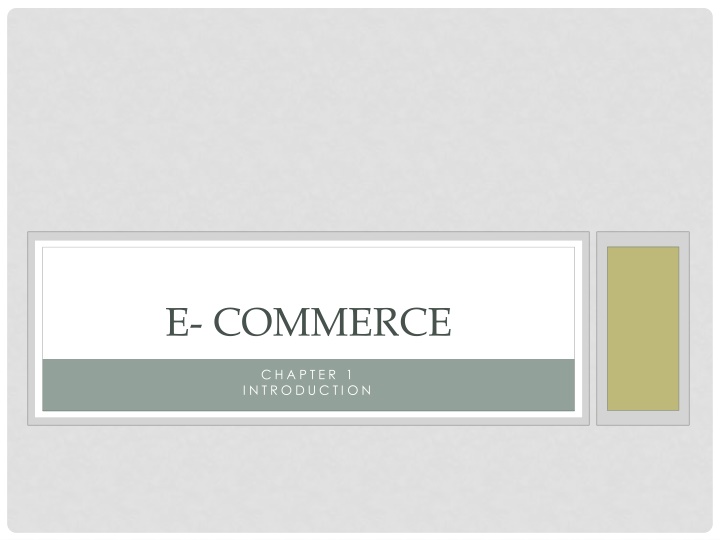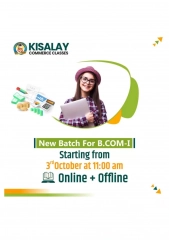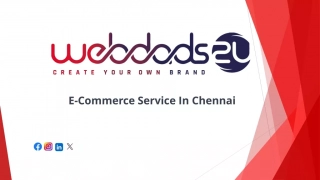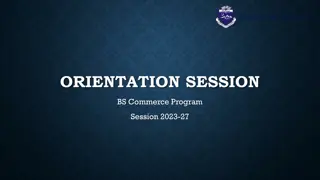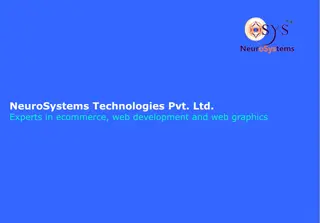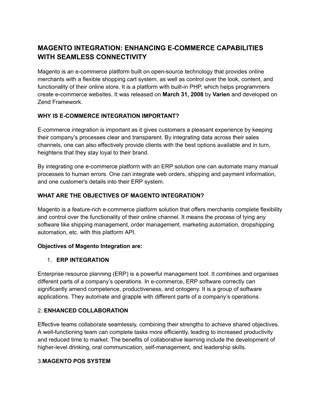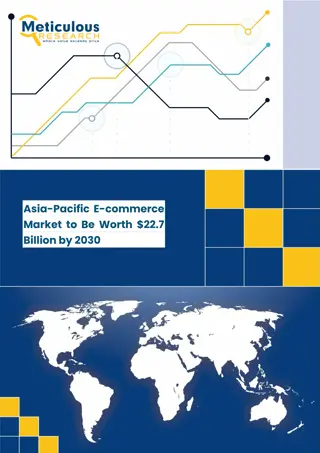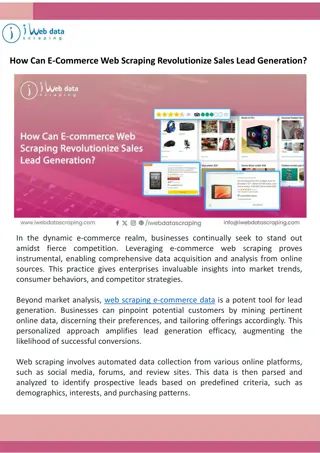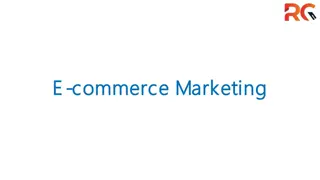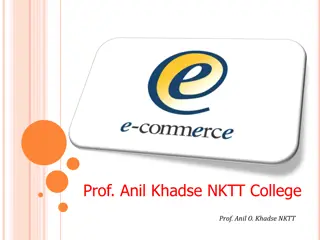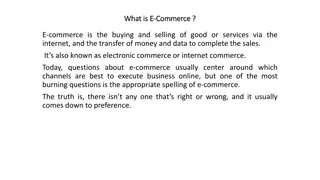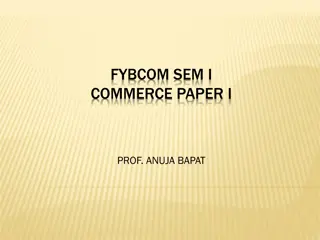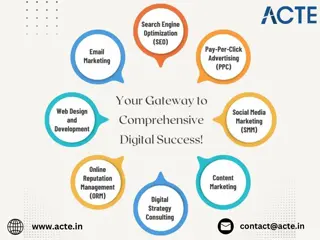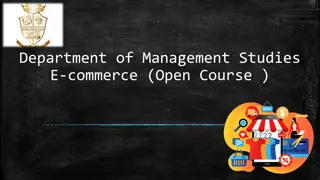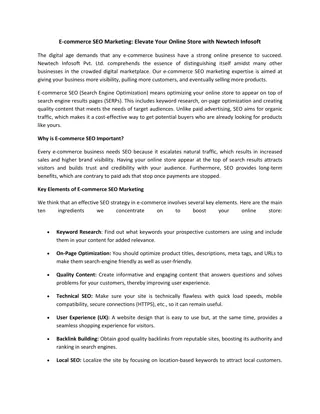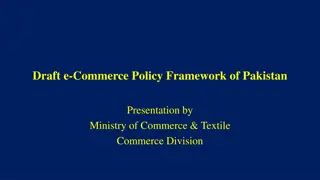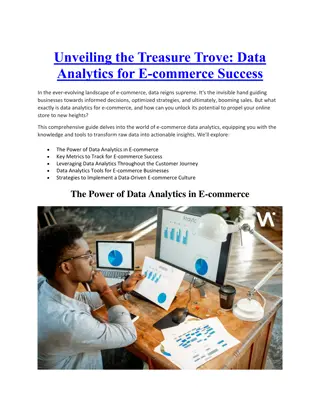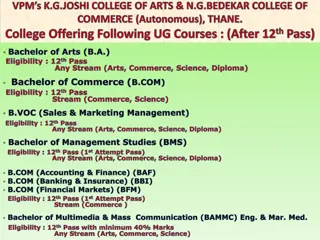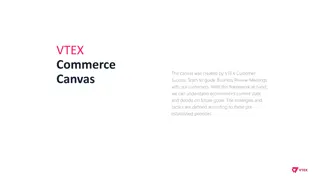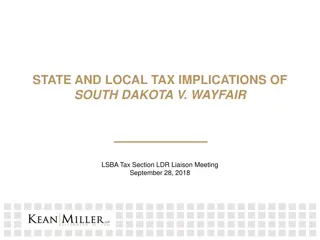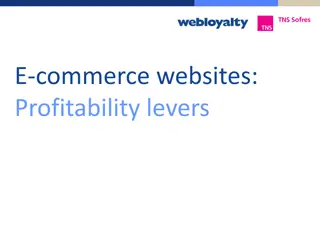E- COMMERCE
E-Commerce, the buying and selling of goods/services online, has revolutionized the way businesses operate. Giants like Amazon and eBay paved the way, and now digital platforms like Paytm and Flipkart offer convenient, secure transactions. Smartphone apps have further accelerated online activities, with endless options for users. Online advertising via social media has opened new opportunities for businesses to reach customers globally.
Download Presentation

Please find below an Image/Link to download the presentation.
The content on the website is provided AS IS for your information and personal use only. It may not be sold, licensed, or shared on other websites without obtaining consent from the author.If you encounter any issues during the download, it is possible that the publisher has removed the file from their server.
You are allowed to download the files provided on this website for personal or commercial use, subject to the condition that they are used lawfully. All files are the property of their respective owners.
The content on the website is provided AS IS for your information and personal use only. It may not be sold, licensed, or shared on other websites without obtaining consent from the author.
E N D
Presentation Transcript
E- COMMERCE C H A P T E R 1 I N T R O D U C T I O N
Concept and Meaning of E- Commerce electronic commerce or internet commerce wide range of buying and selling of goods or services online with the exchange of money or data. any kind of commercial transaction in which the parties interact electronically rather than by direct physical contact. It is also associated with the transaction involving transfer of ownership or right to use goods and services through the computer mediated network.
E- Commerce giants like Amazon and eBay have been leaders in the industry from the beginning and were amongst the first well known e- commerce brands. The concept of e- commerce is surrounded with the application of the Electronic Document Interchange (Electronic Data Exchange, Electronic Fund Transfer), Electronic Messaging (e-mail, fax), Electronic Publishing (marketing, advertisement, sales and customer interaction) and digital library (Amazon- Kindle).
IMPORTANCE OF E- COMMERCE IN THE CONTEXT OF TODAY S BUSINESS The concept introduced in India by our Prime Minister in recent time to make India digitally developed like other advanced countries. Introduction of digitalized methods of payment and habit to pay money shifted from paper currency to cashless transactions i.e. through Paytm, PhonePe, Gpay, etc. due to several restrictions imposed by Government on paper currency. Convenient in term of cost and time. Every day s busy life style makes more dependency on online transactions. Secured mean of doing transaction with confidential password.
Invention of smartphone apps make the companies significantly increased online activities. Various online websites are available in India according to the nature of different trades and businesses like Amazon, Flipkart, Club Factory, Alibaba, Zomato, Uber, Snapdeal etc. User friendly interface. Unlimited customized purchase options and bulky online stores with new fashions and choices. Different promotional strategy like discounts, coupons, offers, referral systems, 30days return guarantee, 1-7 days delivery time, etc.
Online advertising is possible through the huge usage of social media like facebook, what s up, twitter, etc. that make the company profitable way to attract customer online at minimum cost and time. Quick mean to do business outside the territorial boundaries.
ADVANTAGES OF E- COMMERCE OVER TRADITIONAL COMMERCE: E- Commerce Traditional Commerce Point of differenc es Nature Online method of doing business. Transactions are made through direct physical interaction. Transactions are within the local areas. Wide coverage Online trading of goods and services can reached geographical boundaries. Fastest mode of doing business due to easy availability catalogue, online purchase, online payment and quick delivery. limited only beyond the Speed Transactions are limited and time consuming. of online E- Market Electronic marketplace is available at any time (24X7) and from any location. Market places are not available all the time. Rather markets are open for a particular time period in a day. Huge costs are associated for advertisement of product. Advertise ment Cost Online advertising is possible through the huge usage of social media like facebook, what s up, twitter, etc. that make the company profitable way to attract customer online at minimum cost and time.
Customization Unlimited customized purchase options and discount facilities with bulky online stores with new fashions and choices. Customization available with limited choices. is not possible. Limited stocks are Intermediation Intermediary plays a vital role in distribution processes. Disintermediation with the introduction of different business model like B2C, C2C, C2B and B2B help to do direct business more easily and effectively without the help of middleman. Time Time consuming due to physical transactions. Time saver due to online applications. Inventory Cost Inventory cost is reduced due to fast transactions. Inventory cost is high due to excessive inventories and delivery delays. Track customer Easy to track customers purchasing habits. Not possible to track customers habits. Convenience More websites are available in India according to the nature of different trades and businesses like Amazon, Flipkart, Club Factory, Alibaba etc. convenient in dealing transactions. Various online Transactions are possible only with physical contact. Time consuming to handle many deals in a particular time period. Communication Postal mails are used for communication. E-mail or web mails are used between the buyers and sellers for communication. Payment mode Cashless transaction through PayTm, PhonePe, Gpay etc. Cash or credit transaction only. e-commerce is environmentally friendly as no hand bill are provided for purchase. Traditional commerce is not user friendly as because the customer received invoice statement, coupon etc. after purchase. Environment Friendly Relation building A large number of people are associated in social site, chat, various forum that help to establish a strong bond across the various segment in the society. Group creation or building up of a strong bonding is not possible.
DISADVANTAGES OF E- COMMERCE Poor Network Access to modern technology Implementation Cost Lack of personal touch Security Awareness Payment system User resistance Technological drawbacks
MOBILE COMMERCE: BASIC IDEA Mobile Commerce or M- Commerce is the delivery of e- commerce applications directly in the hand of customer through wireless handheld devices like cellular phone, personal digital assistance (PDA s) etc. In short m- commerce is the retail outlet in the hand of customer.
ADVANTAGES OF M- COMMERCE: Fastest mode of transactions Mobility (transactions can be made from any location) Wireless, portable hand held applications Easy to handle Easy to track a place Replace the concept of using laptop or computer for online trading Mobile transactions are secured with password Roaming facilities beyond the network
APPLICATIONS OF M- COMMERCE Mobile banking (bill payment, NEFT, Paytm, phonepe, account review, balance enquiry, etc.) Stock trading Mobile marketing Gathering information on news, traffic/weather updates etc. Easy mailing facilities through email, fax Location based services Mobile phone as a source of entertainment (downloading music, video, playing games)
TYPES OF BUSINESS MODEL IN E- COMMERCE Business to Consumer (B2C): When a business sells a good or service directly to the consumer (e.g. websites like Amazon, Flipkart, Snapdeal, Uber, OLA cabs, Quikr, Zomato, BigBasket and Myntra). Business to Business (B2B): When a business sells a good or service to another business to use (e.g. IndiaMart, IndustryBuying, Bizongo, Alibaba, JustByLive, AmazonBusiness.in, Trade India, etc.). Consumer to Consumer (C2C): When a consumer sells a good or service to another consumer (e.g. buying or selling old furniture through OLX, Quikr, eBay.com, ForeverShop, etc.). Consumer to Business (C2B): When a consumer sells their own products or services to a business or organization (e.g. www.priceline.com) Business to Government (B2G)
Portal: A portal is a website or web page providing access or link to other websites. It is the website that serves as a gateway or cyber door on the internet to a specific field of interest. E-tailer: e- tailer often called e-retail (or e- tail) is an online form of traditional retailer.
Content Provider: Content providers are the information, publisher and entertainment companies provide digital content over the website for a subscription fee. Transaction Broker: A transaction broker does not represent the buyer or seller, but instead they processes online transactions for consumers to complete a sale. For example: Amazon or flipkart are the transaction broker as they charges fee from the businesses for selling their product or services to the customer. But no fees are taken from the customer.
